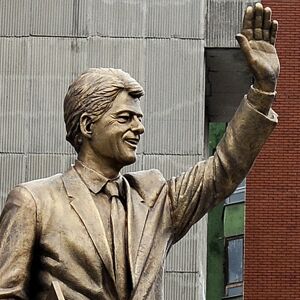
Bill Clinton’s Statue Is in Kosovo
In November, former U.S. President Bill Clinton attended the unveiling of an 11-foot bronze statue of himself before a large crowd of cheering Albanians in downtown Pristina, the capital of Kosovo.
“I am profoundly grateful that I had a chance to be a part of ending the horrible things that were happening to you 10 years ago,” Clinton said in front of the adoring crowd, referring to nato’s 1999 bombing campaign against Serbia. The U.S.-led campaign forced Slobodan Milosevic’s army to evacuate its sovereign territory in the province of Kosovo, effectively paving the way for Kosovo’s secession.
nato, we should note, was established in 1949 as a defensive alliance among 10 European nations, the United States and Canada. Under terms of the alliance, nato members agreed to defend any member state invaded by an enemy nation.
In October 1998, however, nato “expanded” its mandate to include missions that would extend “freedom” and “human rights” throughout Europe—even if it meant going beyond the boundaries of nato member states.
Like Kosovo, for example.
With its newly revised mandate, nato immediately set its sights on Serbia, which had been cracking down on separatist forces in Kosovo throughout 1998. This culminated in the 78-day aerial campaign that President Clinton authorized in early 1999.
It is, however, Germany that is responsible for both starting and ending the war in Kosovo. From the beginning of Yugoslavia’s dissolution, the German government covertly supplied separatist forces in Kosovo, known as the Kosovo Liberation Army (kla), with military intelligence, training and weapons. The kla had also been linked to the Albanian mafia and various Islamic terrorist groups, including Osama bin Laden’s al Qaeda.
“Without any questions,” the kla is a “terrorist group,” said President Clinton’s special envoy to the Balkans, Robert Gelbard, on Feb. 23, 1998. “The future of Kosovo is within Yugoslavia,” Gelbard added, after meeting with Yugoslav President Slobodan Milosevic for several hours. The Clinton administration set up the Belgrade meeting with Milosevic to inform him that the United States was ready to reward Yugoslavia for its “good will” in implementing the peace accords the U.S. had brokered in 1995. Milosevic took that as his cue to stamp out the separatist rebellion in Kosovo.
Then, practically overnight, America—after being pressured by Germany—hung Milosevic out to dry.
Just three weeks after the Belgrade meeting, the State Department accused Milosevic of ethnically cleansing Albanians from Kosovo. President Clinton threatened the use of force against Serbia if violence in Kosovo didn’t simmer down.
When asked by Congress if he still considered the kla a terrorist group, Gelbard told lawmakers that while the kla had “committed terrorist acts,” it had “not been classified legally by the U.S. government as a terrorist organization” (emphasis mine throughout).
They committed acts of terrorism, but were no longer terrorists!
“Unfortunately and tragically, terrorist acts have occurred,” said Gelbard, “and they have provided an excuse for Milosevic here. But, as I said, there is no question at all that the overwhelming, brutal, repressive, despicable violence—the criminal actions, I believe, committed by the Federal Republic of Yugoslavia here—are responsible for the tragedy we have at hand right now.”
Three weeks earlier, there had been no question that the kla was responsible for the violent unrest in Kosovo. Now, no question, it was Milosevic.
Germany, the kla’s primary state sponsor, had spoken. And the United States abruptly switched sides in the Balkan conflict.
A few days before Gelbard’s flip-flop at the congressional hearing, the so-called “contact group” of Germany, Britain, France, Italy, Russia and the United States met for an emergency meeting in London to discuss Kosovo. During the meeting, the group of six decided to punish the Milosevic government with sanctions intended to pressure Yugoslavia into granting broad autonomy to the Albanians in Kosovo.
This, just two weeks after an American envoy assured Milosevic that the future of Kosovo is within Yugoslavia!
“This time, we must respond before it is too late,” said U.S. Secretary of State Madeleine Albright. “When the war in the former Yugoslavia began in 1991, the international community did not react with sufficient vigor,” she remembered.
Of course, as our regular readers know, it wasn’t the international community’s failure to act in the Balkans that caused war to break out in the former Yugoslav republics. It was our failure to stand up to Germany (and the Vatican) after it insisted on moving forward to recognize Slovenia and Croatia, despite strenuous protests (initially) from the United States, the European Union and the United Nations.
As much as the U.S. might want to forget about this history, the new, German-backed breakaway states haven’t forgotten. In 1993, for example, Croatia erected a bronze statue in honor of German Foreign Minister Hans-Dietrich Genscher, the first diplomat to recognize Croatian independence.
According to the Associated Press, the onetime foreign minister “championed Croatia’s independence in 1991 and pushed a hesitant Europe to recognize its secession from federal Yugoslavia” (June 3, 1997).
Kosovo’s 2008 declaration of secession was merely the final chapter of Germany’s Balkan conquest. Besides disempowering its traditional enemy Serbia, “Berlin was able to successfully reassert its claim as hegemonic power in Southeast Europe,” wrote German-Foreign-Policy.com.
There may be a bronze statue of President Clinton in Kosovo commemorating the American firepower that ousted Milosevic from his former Yugoslav republic. But Germany is the one responsible for the breakaway.
This is why, when they declared their independence in 2008, Kosovars waved German flags alongside their American counterparts.
And this is why, on one of the banners celebrating Kosovo’s proclamation, it read, “Thank you Germany!”
